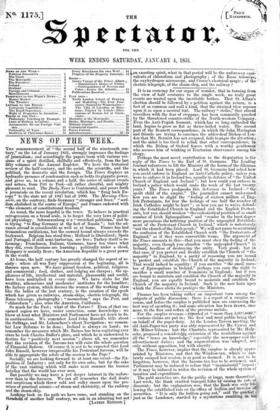NEWS OF THE WEEK.
THE commencement of "the second half of the nineteenth cen- tury," on the 1st of January 1851, strongly impresses the feelings of journalism ; and accordingly the papers teem with various ver- :sions of a spirit distilled, skilfully and effectively, from the last fifty volumes of the Annual Register. We have the historical review of the half century, and the social, the scientific, and the .political, the domestic and the foreign. The Times displays an (hydraulic pressure of condensation such as befits its gigantic power, rand gives us in a column and a half, the series of salient events -and actors, from Pitt to Peel—all rather cheerful, and mighty .pleasant to read. The Daily News is Continental, and pours forth a jeremiade on the recent revolution which has "flung back Eu- rope " to the state not of 1847 but of 1800. The Morning Chro- nwle' on the contrary, finds Germany "stronger and freer, " serf- ‘dom abolished in the centre of Europe," and France endowed with "the element; of constitutional freedom."
As -usual, the more hopeful is the truer. To believe in practical retrogression on a broad scale, is to forget the very laws of politi- cal physiology. Sehwarzenberg is a "wretched politician," and he is frying "to fling Germany at the feet of Russia " ; but the ad- vance abroad is considerable as well as at home. France has had tremendous oscillations, but the onward bound always exceeds the backward. Belgium has stood firm ; Holland is liberalized ; Spain and Portugal, if still semi-barbarian, are free ; Turkey itself is re- forming ; Frenchmen, Italians, Germans, know ten times what they did, even Russians are learning ; politically under a cloud, Hungary is socially freer ; the American Republic is a great power in the world.
At home the half century has greatly changed the aspect of so- ciety: where all was Tory suppression at the beginning, all is thrown open now. We have gained freedom, political, religious, and commercial; food, clothes, and lodging are cheaper • the ap- pliances of life, intellectual and material pleasurable and useful, have been multiplied in every class. We have clubs for the wealthy, athenaeums and mechanics' institutes for the humbler ; the factory system, which dresses the women of the working class like the ladies of the last century, is the creation of the epoch which has given us railways, steam-ships, electric telegraph, the Rosse telescope, photography ; "mesmerism" says the Post, and "chloroform"; also, cries the American, California.
So much for the Past ; what of the Future ? Even of that un- opened region we have, under correction, some knowledge : we know at least what Ministers and Parliament have set down to do, in continuation. We remember Lord John Russell's bills about the Suffrage, and Mr. Labouchere's about Navigation ; we remem- ber Law Reforms to be done' Ireland is always on hand ; we remember the measures which Mr. Baines has been cogitating ever since he took Charles Buller's place, and which he is understood to destine for "positively next session"; above all, we remember that the revision of the Income-tax will raise the whole question of Financial Reform. Of course it is not to be expected that Lord John Russell, however irrepressible his Protestant fervour, will be able to iippropriate the whole of the session to the Pope ?
Socially, we are looking forward to at least one event—the Ex- position of Industry; not only for its own sake, but for the sake of the vast visiting which will make next summer the busiest holyday that the world has ever seen. But possibly we may have a yet deeper interest in the unfore- seen than in the foreseen. We can all remember the dull doubt and scepticism which threw cold and sulky sneers upon the pro- mises of practical science—of steam and electricity, of the railway and the steam-ship. Looking back on the path' we have come, and standing on the threshold of another half century, we ask in an admiring but not [LATEST EDITION.] an exacting spirit, what in that period will be the unforeseen equi- valents of chloroform and photography ; of the Rosse telescope, the oxyhydrogen microscope, and Crosse's electrical magic ; of the ' electric telegraph, of the steam-ship, and the railway ?






























 Previous page
Previous page